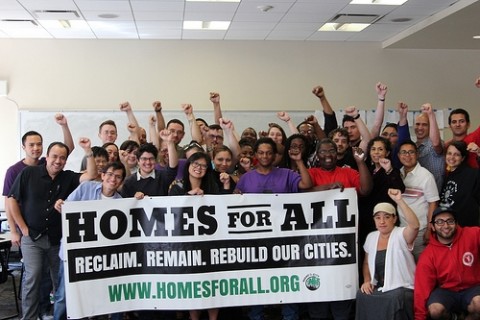As the income gap widens, the fight for urban justice becomes even more vital. The Right to the City Alliance launched its national campaign, Homes For All, more than two years ago and it has achieved many notable victories recently.
While the fight for justice is not over, the tide seems to be shifting towards a stronger affordable housing and urban justice movement. Through the intersection of racial, economic, and environmental justice, The Right to the City Alliance is redefining how local governments view affordable community housing; through national and local engagement, Homes For All seeks to delineate new norms for local governmental policies. Below is a brief review of what the alliance has accomplished this year: Tenants Together and Alliance of Californians for Community Empowerment have recently won the first rent control law in California in 30 years. This stabilization of rent will help 20-25% of the population of Richmond, a small Bay Area city, which is also largely low income. The coalition of these two housing rights organizations has spearheaded actions against landlords, pressured representatives at town hall meetings, and organized tenants across the state. Their platform is based around implementing stronger code enforcement, stabilizing rent increases to around 1.5%-3% per year, and protecting against wrongful evictions. While they successfully lobbied for one of the strongest ordinances in California, the Richmond Rent Control Ordinance, they received backlash from the landlords who began immediately collecting signatures to repeal the ordinance. The landlords temporarily over-turned the ordinance until November 2016, however ACCE and Tenants Together are continuing to organize and mobilize for the upcoming ballot.
Chainbreakers, an urban justice group in Santa Fe, recently pushed the Resident’s Bill of Rights Resolution through their City Council. This established a comprehensive tool for political accountability, community organizing, and city planning policies. Through the pressure exerted on politicians, several community organizations, members, and allied groups were able to have the bill of rights passed through the Santa Fe City Council. CAAV Organizing Asian Communities, CASA New Settlement, and Metropolitan Council on Housing worked tirelessly to advocate for the historic 2015 Rent Freeze in New York City. With De Blasio’s election in 2013, this alliance pressured the administration to place more tenant-friendly members on to the Rent Guidelines Board; in addition, the coalition pushed for rent hearings to be held in every borough as well as changing the times of these meetings from the daytime to evenings to ensure that working people could attend. The fight began in 2014 when this coalition pushed the Rent Guidelines Board to hold citywide hearings and demanded the stabilization of a rent increase of 1% on 1year leases and 2.75% on 2-year leases. However when de Blasio was not able to make meaningful changes to these laws, 2015 became the battleground for rent stabilization. 2015 was also influential because it was the year that the codes and enforcement of the Rent Guidelines Board came up for renewal. For the first time in 46 years, the rent freeze passed with intense local action, participation, and political pressure. This coalition had a multilingual, unifying platform that strengthened common political will. Past rent increases hadallowed landlords to make an enormous profit of 30 cents on the dollar; this unfettered gain has allowed for rapid gentrification and displacement of many low income New Yorkers. The New York City-based alliance is now pushing for a rent rollback in 2016 to balance out the rent increases and hopefully ameliorate the urban justice issues in NYC.
From California to New York, housing justice is gaining momentum across the nation. With the active participation of ordinary people, the housing justice movement will achieve the gains it needs to make affordable housing a right for all Americans. To get involved with Right to the City (http://righttothecity.org) or Homes For All (http://www.homesforall.org) please visit their websites lend your support.

